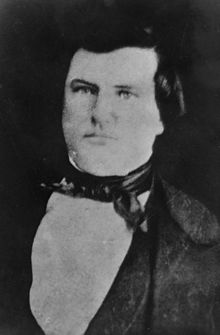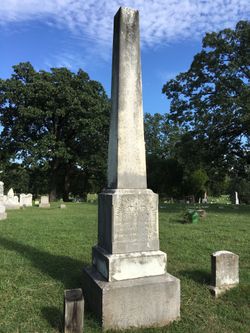
John Selden Roane
John Selden Roane was born in 1817 in Lebanon, Tennessee. He was the nephew of Archibald Roane a governor of Tennessee. Roane attended college at Cumberland College in Kentucky and at age twenty moved to Arkansas where his brother lived. He was elected to the Arkansas state legislature. When the Mexican War began, he raised a company and became its captain. Although he had no military experience, he was soon promoted to lieutenant colonel of an Arkansas regiment. Roane was a likable and intelligent man, but was called too lazy to ever succeed in military service. The regiment performed so poorly at the Battle of Buena Vista that the regiment wasn't used in combat again.
Roane made an enemy during his time in the regiment. Albert Pike commanded a company in the regiment at the time and he resented the fact that Roane had been promoted to lieutenant colonel. He felt like he was more qualified for the position. After the war, back in Arkansas, Pike began to spread stories about Roane's handling of the regiment during the battle. This eventually resulted in a duel between the two men. Both men fired twice, missing each time and then agreed to stop the duel. In 1849, Roane was elected as Arkansas's fourth governor. Evidently the stories of his performance in the Mexican War didn't affect how the voters felt about him.
When the Civil War began, Roane was against secession, but sided with his adopted state and received a promotion to brigadier general during the spring of 1862. He took command of a brigade in Van Dorn's army and was ordered to Corinth, Mississippi, but was soon sent back to Arkansas to defend the state from Samuel Curtis's invading force. He managed to harass Curtis enough to save the state. Thomas C. Hindman soon replaced Roane and took his troops. This turned Roane against Hindman. Soon the entire department was in an uproar as Roane was frustrated at Hindman, Hindman was quarreling with Pike, and Roane arrested Pike for Hindman. All that was accomplished was severe fighting among the commanders of the department.
Roane led a brigade at the Battle of Prairie Grove and Hindman praised his performance there. Yet, Hindman was forced to break up Roane's brigade because of desertions in his Texas regiments. Roane was the number three ranking general in the department and many feared that if something happened to Holmes and Price, Roane would command all the forces. Although he'd done a fairly good job in his Civil War actions, everyone feared for him to command the forces in Arkansas. He was given an infantry brigade in late 1864, but saw little action for the remainder of the war.
John S. Roane died at the age of 50 in Pine Bluff, Arkansas in 1867 and rests today in Oakland Cemetery, Little Rock, Arkansas. There were many generals in the war that were far worse than General Roane, but today most historians claim that Roane was disliked by his troops and his superiors. They call him a politician with no military talent. His record, though limited, shows him to have been fairly successful in all of his endeavors.

Grave of Governor/Brigadier General John S. Roane








